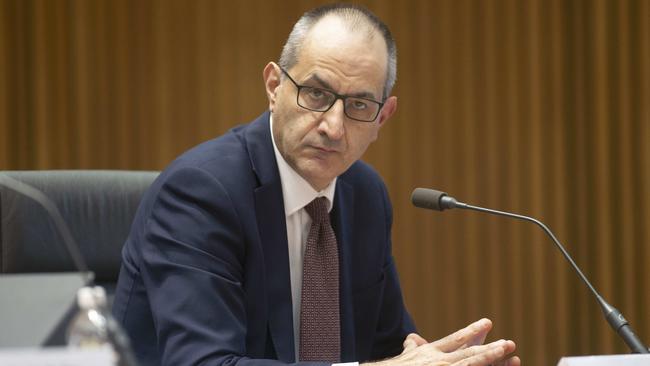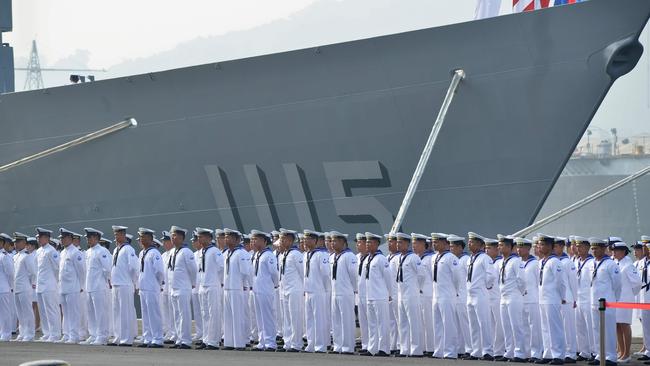Home Affairs secretary Mike Pezzullo explains ‘beating drums of war’ warning
One of Australia’s top security figures has been grilled about his controversial warning that the “drums of war” with China were building.
One of Australia’s most senior security figures said the global community missed an opportunity in the early 1990s to live in a peaceful world without the threat of “great power conflict” while being grilled for his recent warning of the “beating drums” of war.
Home Affairs secretary Michael Pezzullo attempted to play down his controversial comments published on the department’s website on Anzac Day, insisting the threat of a great power war was unlikely but called for policies to encourage peace – specifically in the Indo-Pacific between China, United States and its allies.
“The optimism we all felt in the early 90s with the fall of communism, dissolution of the Soviet Union, and the increasing globalisation of trade, travel, international commerce was going to give us a more enduring basis for peace,” he told Budget Estimates on Monday morning.
“Some two decades ago, we had a chance as a global community to evolve globalisation and global interaction in a different way.
“We chose as a common humanity not to, so we now live in a world that’s a lot more perilous than the world was in prospect after the fall of communism.”
RELATED: War with China ‘likely’ in five to 10 years, says Pyne

Mr Pezzullo refused to speak specifically about China and the United States, despite being repeatedly grilled by Greens senator Nick McKim, though he referred to a previous speech of his that named China as the source of conflict.
“I’ve made a general point that the world is in not as stable condition had it might have been had different choices been made through the 90s,” the senior security figure said.
“That has introduced a degree of peril into our strategic calculations and it’s important to be prudent, to be watchful, to be alert to trends, to be prepared, and to do everything possible through policy choices to diminish the risk and the likelihood of things like great power conflict.”
In the widely circulated letter from Anzac Day, Mr Pezzullo likened the “new risk of militaristic aggression” to the rally from former US president Dwight D Eisenhower, who warned his country and its allies about the Soviet Union in 1953.
“Throughout his presidency, Eisenhower instilled in the free nations the conviction that as long as there persists tyranny’s threat to freedom they must remain armed, strong and ready for war, even as they lament the curse of war,” Mr Pezzullo wrote.
“Today, as free nations again hear the beating drums and watch worryingly the militarisation of issues that we had, until recent years, thought unlikely to be catalysts for war, let us continue to search unceasingly for the chance for peace while bracing again, yet again, for the curse of war.
“War might well be folly, but the greater folly is to wish away the curse by refusing to give it thought and attention, as if in so doing, war might leave us be, forgetting us perhaps.”

The threat of war has been discussed openly in recent months, with former defence minister Christopher Pyne warning Australia will likely be dragged into a conflict with China in the next five to 10 years amid a looming “global catastrophe”.
The long-serving Liberal politician said the Asian superpower’s annexation of Hong Kong’s legal system and treatment of the ethnic Uyghur minority in western China proved President Xi Jinping intended to ramp up dominance in the Indo-Pacific.
Mr Pyne, who served as both defence industry and defence minister under Malcolm Turnbull and Scott Morrison, said the likely flashpoint was conflict with Taiwan, which he described as the “most concerning of all” of China’s overt indications of aggression.
In an address to the University of Adelaide in April, he said the likelihood of a “kinetic war” with China was more likely than when he served in the pivotal defence cabinet positions.
“Five years ago, I would have said that the possibility was very unlikely. Now I would have to say that the possibility is more likely than it was then,” Mr Pyne said.
“Not a cyber war but a real one involving loss of life, destruction of military platforms, with aggressors and defenders on different sides.
“This isn’t rhetoric. This is something that you and I may well have to confront in the next five to 10 years.”



